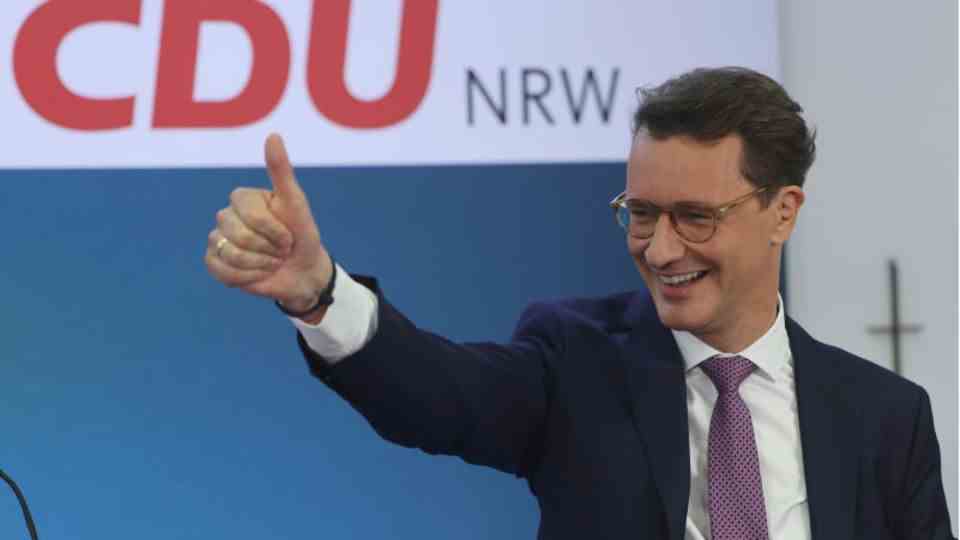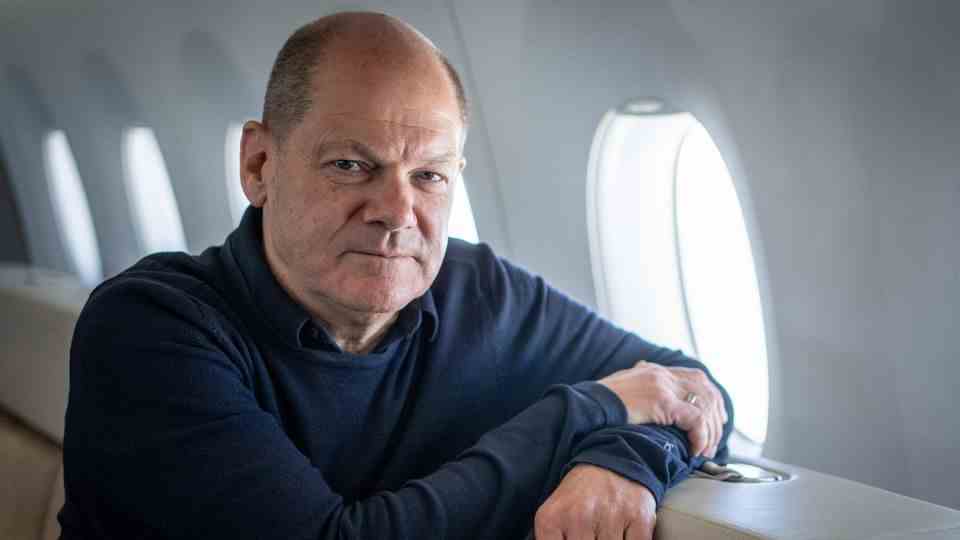TV debate
“Anne Will”
Spahn hands out traffic light after election debacle: “There was only agreement on cannabis”
The talk round at Anne Will: Jens Spahn quickly secured the unwelcome role of the teasing fifth wheel in the traffic light group
© NDR/Wolfgang Borrs
In North Rhine-Westphalia, the SPD and FDP are achieving historically poor results. But who is responsible for this? Ex-Federal Minister of Health Spahn hands out a lot to Anne Will, SPD leader Klingbeil stumbles.
The state elections in North Rhine-Westphalia are shaking the traffic light coalition: while the CDU and Greens are considered winners, the SPD and FDP are achieving historically poor results. The fact that the two governing parties did so poorly in the “small federal elections” in the most populous federal state also raises questions about the federal government. SPD representative Lars Klingbeil in particular finds it difficult to defend himself against “Anne Will”.
On Sunday, directly after the NRW elections, Anne Will will discuss the following on the ARD talk show:
Jens Spahn (CDU), former Federal Minister of Health
Lars Klingbeil, SPD party leader
Ricarda Lang, Federal Chairwoman of the Greens
Christian Dürr, chairman of the FDP parliamentary group
Mariam Lau, journalist (“Die Zeit”)
The CDU around Prime Minister Hendrik Wüst wins, the Greens achieve a historic top result, the SPD a historic defeat, the previous coalition partner FDP just barely misses the exit from the state parliament. This is the balance of the NRW election on Sunday.
SPD representative Lars Klingbeil in particular, whose party had predicted a “social democratic decade” by the end of 2021, lands on the hard ground of facts with Will. But he obviously doesn’t want to admit it to himself: “We would have liked to have gotten more,” admits Klingbeil. Nevertheless, he is sticking to a possible government participation of the SPD in North Rhine-Westphalia and a ministerial post for top candidate Thomas Kuschaty. “Mr. Wüst has to see if he can get the majority,” said Klingbeil. In fact, a traffic light coalition could also form in NRW.
FDP admits “bitter election defeat”.
Christian Dürr, on the other hand, is more refined: “For the FDP, this is a bitter election defeat,” he says. He is particularly annoyed that the party has done so poorly among older voters. But: “As a liberal, you have nerves of steel,” Dürr notes. After the debacle in the Schleswig-Holstein elections last Sunday (minus 5.1 percentage points), he speaks from experience.
Biggest argument: Spahn against Klingbeil
But who is to blame for the repeated defeat of the SPD and FDP? Jens Spahn quickly secures the unwelcome role of the teasing fifth wheel in Will’s traffic light group. He distributes tips, especially in the direction of his former GroKo colleague from the SPD.
He is surprised at the government hopes of the SPD in North Rhine-Westphalia. After the historically worst result for the Union in the 2021 federal election, the parties took the time to derive and learn something from the results. “I would also like that from the SPD,” says Spahn with a smile.
The CDU politician also shoots in the direction of SPD Chancellor Olaf Scholz: He saw election posters with the Chancellor’s image everywhere in North Rhine-Westphalia, but he hardly said anything about the topics relevant to the election polls, such as price increases. “I haven’t even heard anything from the chancellor about how we want to deal with inflation,” says Spahn. Even Will has to agree.
Klingbeil doesn’t seem to impress his former GroKo colleague: “You can tell that Mr. Spahn has arrived in the opposition role and he obviously enjoys it,” he says.
Is Chancellor Scholz to blame for the NRW debacle?
In fact, the overactivity of the chancellor and his simultaneous apparent inactivity at the federal level get the SPD politician Klingbeil into trouble several times. Klingbeil has no concrete answer to Mariam Lau’s accusation that the Chancellor’s communication was opaque and sometimes even arrogant.
“Politicians are different in their communication,” he falters. “If at the end of the war it’s said that the chancellor hasn’t communicated enough for a week or two, that’s great for me.” And one cannot help but wonder whether some SPD voters are turning their backs on their party because of this attitude.
Klingbeil’s traffic light colleagues Christian Dürr and Ricarda Lang, on the other hand, are helping him. Lang, in particular, does not see the NRW debacle as harm for the Federal Chancellor – nor for the traffic lights. A stable federal government is more important than competition among each other. Dürr also wants to give priority to nationwide projects. “The previous government left a lot behind,” he says, putting the clamoring oppositionist Spahn in his place.
Spahn stirs up: Ampel only has unity when it comes to cannabis
As the show progresses, it becomes increasingly unclear whether it is about the analysis of the NRW election results or the CDU’s late revenge campaign. In any case, Spahn is launching a final attack: The traffic light does not agree on an excessive number of points and is wasting the time of the voters with explanations instead of actions. “The only thing that was quickly agreed upon was cannabis legalization,” he says.
The rest just shake their heads wearily. “It is clear that there is not always complete agreement,” says Lang. “Otherwise we would not have joined different parties.” The two relief packages with the energy price flat rate, the 9-euro ticket and the children’s bonus have proven the traffic light’s ability to act.
But is this pragmatic explanation enough for the actual failings of the young coalition? After all, social organizations had criticized that pensioners had been forgotten in the two packages. In addition, the short-term measures neither replace the long-term change in terms of climate neutrality and social justice nor their financing. Topics that the traffic light parties had advertised in the election campaign.
Whether and how their implementation is involved in the results of the NRW election cannot be answered until the end of the program – and probably not afterwards either. A summary by Green politician Lang, on the other hand, aptly reflects the current overall situation: “We are experiencing different challenges than we could have imagined in the coalition negotiations.” At least for their coalition partners from the FDP and SPD, another election result should have been added after this.



